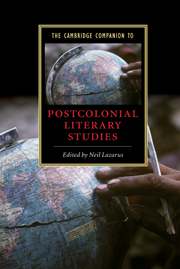Book contents
- Frontmatter
- 1 Introducing postcolonial studies
- Part 1 Social and Historical Context
- 2 The global dispensation since 1945
- 3 Anticolonialism, national liberation, and postcolonial nation formation
- 4 The institutionalization of postcolonial studies
- Part 2 The Shape of the Field
- Part 3 Sites of Engagement
- References
- Index
- Series List
2 - The global dispensation since 1945
from Part 1 - Social and Historical Context
Published online by Cambridge University Press: 28 August 2006
- Frontmatter
- 1 Introducing postcolonial studies
- Part 1 Social and Historical Context
- 2 The global dispensation since 1945
- 3 Anticolonialism, national liberation, and postcolonial nation formation
- 4 The institutionalization of postcolonial studies
- Part 2 The Shape of the Field
- Part 3 Sites of Engagement
- References
- Index
- Series List
Summary
The purpose of this chapter is to provide an overview of political and economic developments in the world system since the end of the Second World War in 1945. There are several reasons why it seems important to begin a volume devoted to postcolonial studies with an account of this kind - not only to “set the scene,” as it were, to discuss the conditions prevailing in the post-war years, as the great movements for independence and national liberation in Africa, Asia, and the Caribbean gathered momentum in the drive towards decolonization; but also to sketch the contours of the global dispensation into which the new countries were subsequently precipitated at independence (joining the Latin American states, most of which had achieved political independence in the nineteenth century), and in the context of which they had to take their place, for the most part as relatively poor and relatively poorly resourced nation-states (both undeveloped and under-developed) in an inegalitarian, unevenly integrated, and highly polarized world system of nation-states. It is impossible to understand the fraught trajectories of developments in these new nation-states in the decades since their decolonization - hard-won victories as well as an abundance of what the historian of Africa, Basil Davidson, has called “setbacks and defeats” (1983: 95) - without a consideration of the global picture, both of the shifting balance of geopolitical forces and of transformations and restructurings in capitalism and capitalist class relations world-wide. The dispositions of power in the world system have not only set certain untranscendable limits to what it has been possible, and what impossible, for the newly decolonized states to achieve; they have also been such as to determine - or at the very least powerfully influence - policies and practices in these new states (as also in their older Latin American counterparts) even in situations where their leaders have imagined and sought to put forward and implement credible alternatives.
- Type
- Chapter
- Information
- The Cambridge Companion to Postcolonial Literary Studies , pp. 19 - 40Publisher: Cambridge University PressPrint publication year: 2004
- 10
- Cited by

